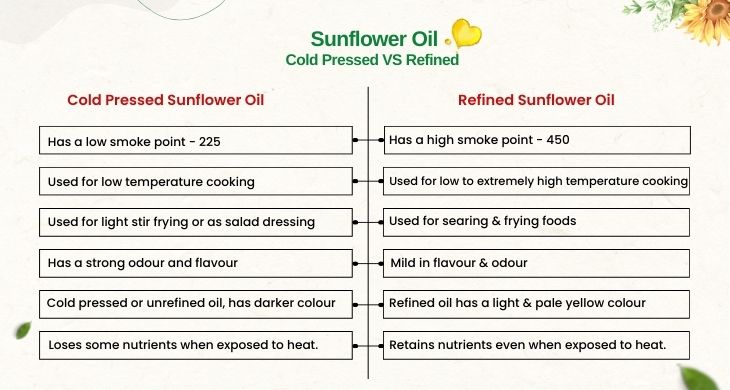In the culinary world, the debate between refined and cold-pressed oils is a hot topic. While some health enthusiasts vigorously champion cold-pressed oils, refined oils also have a place in the kitchen. Let’s explore both sides to better understand these two types of oils.
| Refined Oils | Cold-Pressed Oils |
| A Clearer Picture | The Unrefined Truth |
| Refined oils are often viewed with scepticism, but they’re not inherently detrimental to health. Here’s why they might be a practical choice: | Cold-pressed oils are praised for their nutritional quality and flavour |
| High Smoke Point - Refined oils can withstand high temperatures, making them ideal for frying and sautéing without breaking down and releasing harmful compounds. | Rich in Nutrients - These oils retain their natural antioxidants and polyphenols, which can contribute to overall health. |
| Neutral Flavour - These oils have a neutral taste, which is perfect when you don’t want the oil to overpower the flavour of your dish. | Full Flavour - They offer robust flavours that can enhance the taste of food significantly. Yet, cold-pressed oils aren’t without their cons |
| Purity and Shelf Life - The refining process removes impurities, which can enhance safety and extend the shelf life of the oil, ensuring it remains stable for longer periods. However, it’s not all positive. Refined oils do have some drawbacks | Lower Smoke Point - They generally have lower smoke points, which can be a disadvantage for certain cooking methods like high-heat frying. |
| Nutrient Reduction - The process of refining can diminish the oil’s natural nutrients, such as antioxidants and vitamins, which are more abundant in cold-pressed oils. | Shorter Shelf Life - Without the removal of impurities, these oils can spoil more quickly. |
| Potential for Trans Fats - Some refined oils can contain trans fats, particularly if hydrogenated, which are detrimental to heart health. |

How to Make an Informed Choice
The choice between refined and cold-pressed oils should be guided by cooking needs and health considerations:
- Balance Your Fats: It’s crucial to maintain a balance between omega-6 and omega-3 fatty acids to avoid inflammation. Both types of oils can be part of a healthy diet if used wisely.
- Purposeful Cooking: Consider the cooking method and the desired flavour profile when selecting an oil. Refined oils are suited for high-heat cooking, while cold-pressed oils are better for dressings and low-heat cooking.
Remember that both refined and cold-pressed oils have their place in the kitchen. By understanding their properties and how they can best be used, you can make more informed choices that align with your health goals and culinary needs. We should not forget that the key to a healthy diet is diversity and balance—not just in the types of oil you use, but in all food choices.

